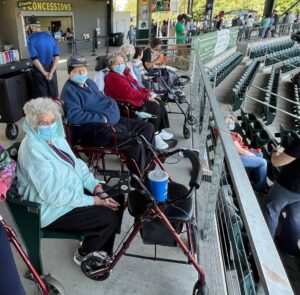As we age, our body naturally loses memory capacity. On average, humans can retain between 5-9 pieces of information at one time when we are not distracted. Over time, this number goes down, but neuro-healthy individuals can usually retrace their steps to remember something they’ve forgotten. A trigger will help you to regain your memory. With over 6 million Americans suffering from Alzheimer’s, knowing the early differences between normal memory loss and dementia are key to early diagnosis.
What are the differences?
Memory loss is completely normal as we age, but when you have a family history or predisposition to dementia and Alzheimer’s, you’ll want to know the differences between what is normal and what isn’t. When you have normal memory loss, something causes you to remember what you forgot.
Consider this: you want to make a cup of coffee and on the way to the kitchen, you answer the phone.
By the time you get off the phone and walk into the kitchen, you’ve forgotten what you were doing, but looking at the coffee pot triggers you to remember. This is normal memory loss and happens to all of us as we age or if we are distracted. Someone with dementia will have the same scenario and seeing the coffee pot won’t help to trigger a memory, they will just do something completely different instead. The memory loss disrupts daily life and eventually moves into difficulty or inability to complete familiar tasks.
What can we do to prevent Alzheimer’s?
There is no 100% surefire way to prevent Alzheimer’s, because there are factors that go into it beyond our control. For example, women are statistically more likely to develop Alzheimer’s than men. Genetic and biological factors aside, there are ways that you can boost your mental defenses to combat memory loss. Improving all aspects of your health is critical in fighting off mental illnesses.
Exercise
Exercising is crucial for your overall wellbeing and health, including your mental health. Exercise actually helps your brain at the same time as your body. It promotes plasticity in your brain and helps promote new brain cell growth. This can help stave off memory issues and might help in the fight against Alzheimer’s.
Eat healthier
A poor diet affects all parts of our bodies, including our brains. Eating right will help to fuel your brain and keep it activated. Healthy eating is crucial for memory, mood, focus, and many other aspects of our lives that Alzheimer’s affects. Processed food may taste good, but it doesn’t do our body any favors, and this is true when trying to stave off mental diseases. Switch to a diet that is low in processed, greasy, and sugary foods to feel your best physically and mentally.

Residents at Summit Place Assisted Living enjoy homemade meals that provoke fond memories, a sense of belonging, and fulfillment. (Bellingham, WA)
Get a good night’s rest
Sleep is essential for good health. Our bodies, and brains, need it to function. Sleep deprivation prevents your body from functioning at its fullest, and prolonged periods are detrimental to our health. The glymphatic system helps regulate waste in our brains and works best when asleep. Protein buildups that are common in Alzheimer’s patients are in the waste that this system regulates, so getting plenty of sleep can help prevent these buildups over time.
Keep your brain stimulated
Learn new things. Keeping your brain active is important for prolonged mental wellness. As we age, it’s harder for us to learn and retain information. Do brain exercises to stay mentally fit.
How can we help our loved ones?
As we get older, so do those that we love, including our parents and other relatives. So how can we help our loved ones as they age with their memory? Promote their overall health and wellness to them. Eat out at healthy restaurants with them. Get out with them for some exercise, even if it’s just a walk around the block. Stay connected in their lives. This is so crucial to making sure that our loved ones are doing okay.

Fox Hollow residents take in an afternoon at the ballpark. (Eugene, OR)
Know the signs
Educate yourself on the warning signs of Alzheimer’s. Know what the differences are between normal memory loss and Alzheimer’s. Understanding those key differences can help you pick up on things quicker, which can get your loved one help earlier. If you’re concerned that your loved one might be developing or suffering from Alzheimer’s, seek professional help.
Accept help
Finding out your loved one has Alzheimer’s is a devastating blow that comes with worry and uncertainty. The most important thing to remember is, you’re not alone. Seek and accept help for your loved one. Assisted living communities are available to help your loved one retain independence and receive care at the same time. Contact Nightingale Healthcare if your loved one requires additional support because of early stage memory loss. Our facilities can help your family rest easily by knowing your loved one is being cared for the way you want them to be cared for.

Spruce Point Assisted Living offers a loving, compassionate, and highly skilled memory care unit within its community. (Florence, OR)
Our Nightingale Healthcare assisted living communities all assist aging individuals with daily care needs, including: Fox Hollow Residential Care in Eugene, OR; Summit Place Assisted Living in Bellingham, WA; Sunnyside Assisted Living in Sunnyside, WA; and Spruce Point Assisted Living & Memory Care in Florence, OR which also offers a locked memory care unit.
Please don’t hesitate to reach out to us and let us know how we can help you.
